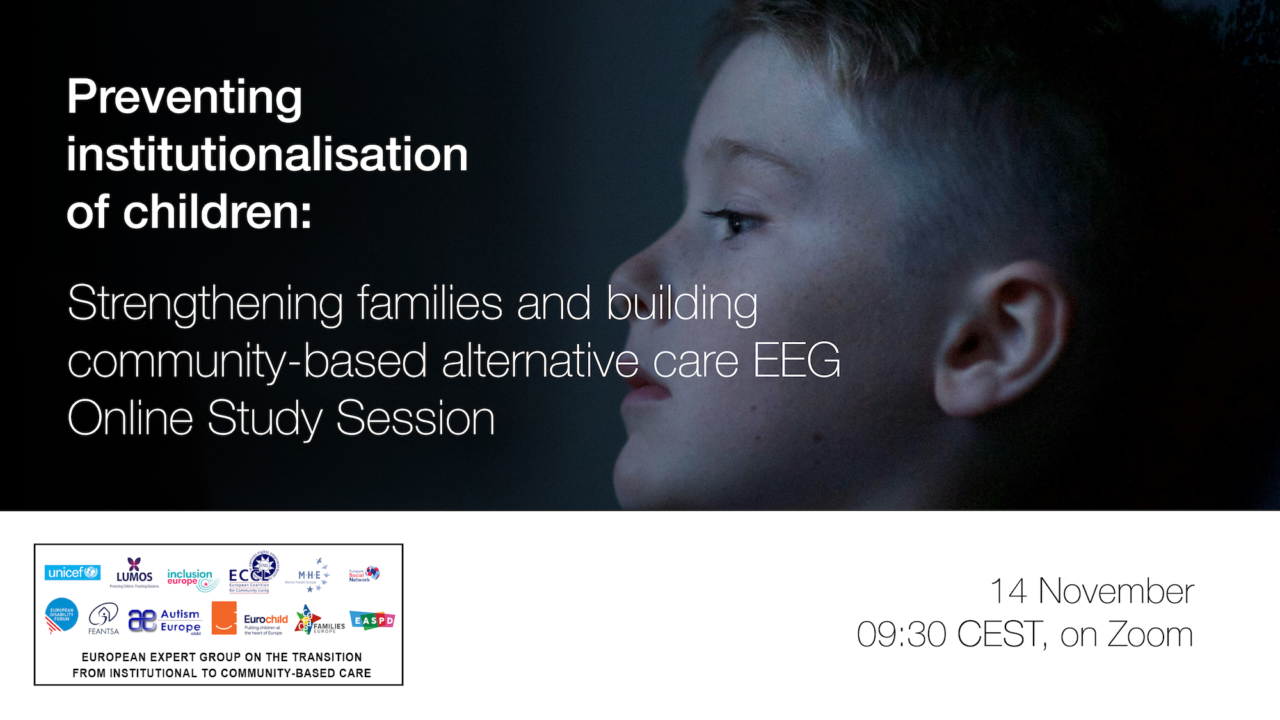EEG Online Study Session
14 November 2024, 09:30 – 12:30
The main drivers of institutionalisation of children include a lack of community-based alternative care and the absence of preventative family support, accessible education and social services in the community. Children belonging to vulnerable families and disadvantaged groups and households, such as children with disabilities and Roma children, are particularly at risk when they and their families are not adequately supported.
The EU has been promoting the transition from institutional to family- and community-based care through EU policy and funds since more than a decade. Although the EU thus highly encourages its Member States to focus on providing community-based alternative care, early intervention, preventative measures and family strengthening, more should be done to share good practices or guidance available and which measures, services and systems can contribute to this goal.
The study session will therefore highlight how the practice relates to EU policy and funds, in particular the European Child Guarantee. It will also explore how the EU Child Guarantee
supports the development of such policies and practice, and how it can be further used to prevent institutionalisation and foster the wellbeing of children and their families. Each session will conclude with a Q&A to ensure participants can ask questions and share their feedback. The EEG study session 2024 will provide examples of effective policies and practices of building community-based alternative care, early childhood intervention and family support and prevention services through Europe:
- Preventing child – family separation in vulnerable families (Spain)
- Family-centred Early Childhood Intervention (Portugal), and
- Developing family-based alternative care (Poland).
| 9:30 – 9:40 | Welcome and Introduction, Camille Roux, EEG Co-chair, Mental Health Europe |
| 9:40 – 10:30 | Family support – strengthening families and preventing child-family separation in Spain This session will show how recent policy reforms in Catalonia have led to enhanced prevention support for vulnerable families, avoiding potential placements in alternative care. Moderator: Martin Lichte, Senior Policy Officer, European Social Network Pau Riera, Policy Officer, Directorate General for Child and Adolescent Care (DGAIA), Regional Government of Catalonia, Spain Luisa Conejos, Head of Sectorial Programmes Service, Department of Social Action and Innovation, City of Lleida, Spain Carmelita Lapadula, Knowledge and Social Innovation Manager, Federation of organisations that care for children and adolescents (FEDAIA), Spain Q&A |
| 10:30 – 11:20 | Family-centred Early Childhood Intervention system in Portugal This session will gather policy makers and representative from non-governmental to look at the Portuguese system for early intervention for children with or at risk of disabilities and developmental delays. Moderator: Irene Bertana, Senior Policy Officer, EASPD Pedro Cunha, Secretary of State for Administration and Innovation in Education, Portugal (TBC) Marta Xavier, Magda Calado, Cooperative for Inclusion, CECD Mira Sintra, Portugal Q&A |
| 11:20 – 11:30 | Break |
| 11:30 – 12:20 | Developing family-based Alternative Care in Poland This session will gather representative from non-governmental organisation and policy makers to discuss the development of family based alternative care in Poland. Moderator: Zuzana Konradova, EU Affairs Coordinator, Eurochild Beata Kulig, Polish Foster Care Coalition A member of Polish Foster Care Coalition or a representative of municipality in Poland (TBC) Representative, National Child Guarantee Coordinator’s team, Labour and Social Policy on European Child Guarantee paving the way for DI of children in Poland (TBC) Q&A |
| 12:20 – 12:30 | Closing remarks, Aurélie Baranger, EEG co-chair, Autism Europe |
